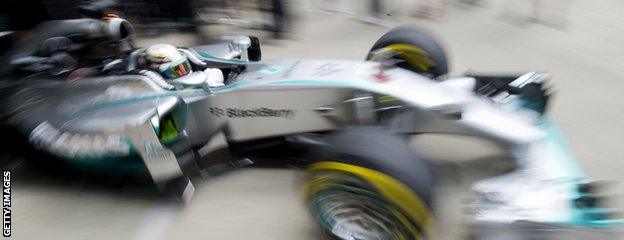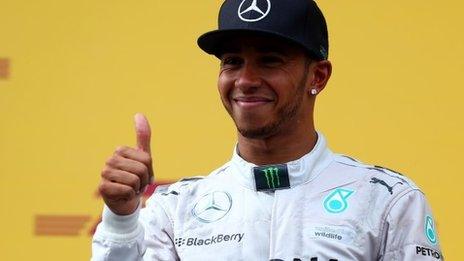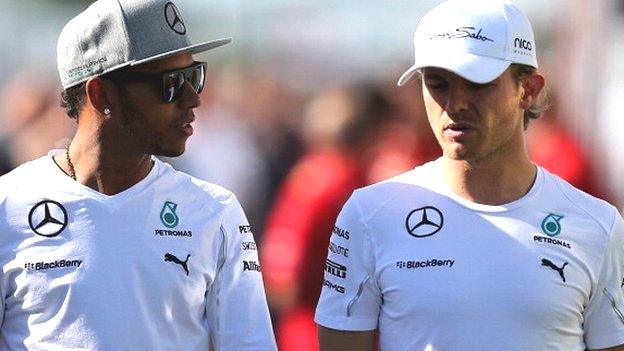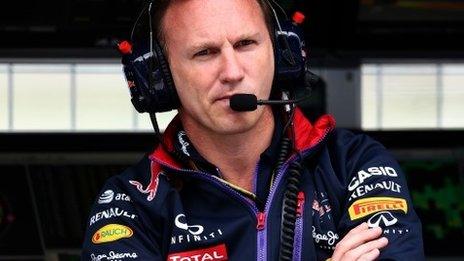Solid Nico Rosberg making life tough for Lewis Hamilton
- Published
Right now, although Lewis Hamilton has a small speed advantage over his Mercedes team-mate Nico Rosberg, he is not capitalising on that consistently enough.
Rosberg is delivering solid results, his points total is ticking along, and he is deservedly reaping the rewards from that. He now has a 29-point lead over Hamilton in the championship.
Hamilton has been unlucky - he has two retirements to none for Rosberg, which have lost him more points than his deficit - but he has dropped the ball a couple of times in qualifying, and the latest example was in Austria this weekend.
Two small errors in qualifying left Hamilton ninth on the grid and, although he fought up to fourth place with an excellent first lap, he could not quite challenge Rosberg for the lead, and ended up finishing behind him.
These new turbo hybrid Formula 1 cars, with their huge amounts of torque and complicated brake-by-wire systems incorporated into their energy recovery devices, are tricky to drive. Maybe that is part of Rosberg's strategy.
Perhaps he has decided not to take the big risks in qualifying, play it slightly steadier, minimise the chances of making mistakes.
Now the deficit in the championship has grown, it's difficult for Hamilton to change his strategy. He has to make sure he is winning grands prix. But if Rosberg does not suffer his own retirement, it is going to take a long time to claw back that gap.
When Hamilton managed to get up to fourth on the first lap, the thought did occur that he might be able to win the race.
At that point, he was right behind Rosberg, who was pressuring the two Williams drivers Felipe Massa and Valtteri Bottas.
Hamilton had a bit more pace than Rosberg, which he had done all weekend, especially in the first sector of the lap.
But having to manage the brakes neutered some of his performance.
The layout of the track meant the DRS overtaking aid did not have much effect, so it was going to take a mistake from Rosberg to get past.
We did see a couple - one at the first corner; one early on the last lap - so Rosberg was not completely in his comfort zone. But hats off to him; he held it together.
It was the second weekend in succession on which Mercedes had had brake problems, even if they had different causes.

That's perhaps a surprise, but Austria - like Canada - is a tough track on brakes, with those big stops into Turns One, Two and Three, and they weren't the only team managing brake problems.
There won't be brake issues at the next race, the British Grand Prix; the layout, full of high-speed corners, will take care of that. So Hamilton can really go for it.
He has to go out and unleash the lap in qualifying and take it from there, and use that opportunity to claw back some of that deficit.
Williams could have tried to take the race to Mercedes a bit harder by altering their strategy a bit, but they were concerned about tyre usage and were almost beaten before they started.
It's so important for them to get big points, but they will be buoyed by the fact they were able to get involved with Mercedes after a strong qualifying performance.
The same goes for Ferrari, for whom Fernando Alonso drove a typically strong race, and was only 18 seconds behind the Mercedes at the finish, much closer than at previous grands prix. Kimi Raikkonen, still struggling to come to terms with the car's driveability issues, was a long way off again.
Williams had definitely moved closer to Mercedes but they were never quite close enough on pace to really challenge them for victory. Their front row qualifying positions were down to mistakes by Hamilton and Rosberg and in the race it was only a matter of time before the Mercedes cars went by.
A final thought. Toto Wolff runs and owns shares in Mercedes Grand Prix. He owns shares in Williams and he manages Valtteri Bottas.
Not since the 1961 Belgian Grand Prix, when Ferraris finished one-two-three-four, has one man partly owned the first four cars across the line in a grand prix.
Wolff is a relatively unknown figure outside the F1 paddock, and even within it to a degree, because he is a relatively new to the business. But he is clearly a man to be reckoned with and someone who will play a big part in the sport over the next few years.
David Coulthard was talking to BBC Sport's Andrew Benson.
- Published22 June 2014
- Published22 June 2014

- Published21 June 2014

- Published22 June 2014

- Published26 February 2019
